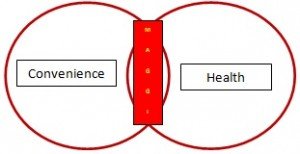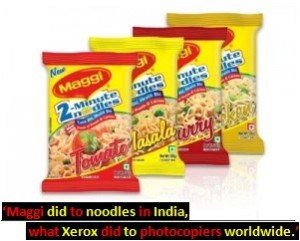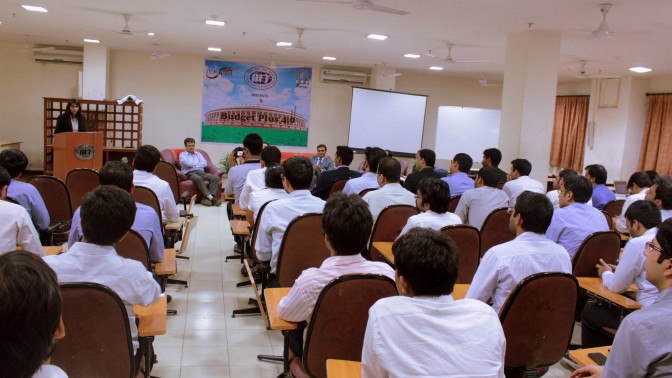Whose product is Maggi? Nestle
Nestle:
-Swiss Company founded in 1866 by Henri Nestle
-Main focus: Great taste + Health, nutrition and wellness
Maggi:
-Nestlé unleashed Maggi in India in 1982
-First Maggi (2-minute noodles) variants in India: Masala, tomato and chicken flavors
-Nestle’s iconic brand
-Flagship culinary brand in India as well as globally
Nestlé India Ltd. (NIL), the Indian subsidiary of the global FMCG major, Nestlé SA, introduced the Maggi brand in India in 1982, with its launch of Maggi 2 Minute Noodles, an instant noodles product.Maggi launched in India at a time when the instant noodles market was not a popular one. Nestle launched Maggi in India with the tagline: ‘Fast to cook and good to eat’ i.e. they focused on Convenience and Health.

Indian Consumer: The Indian consumer was on a lookout for a product that would provide quality food and was also convenient at the same time. Maggi recognised this need and thought of a ‘fast relief from hunger’ product.
In a fast growing India, where women were no more just home makers but professionals helping their spouses to run their households, cooking food was an important issue. Therefore, initially maggi 2-minute noodles targetting the women. But the sales was not picking up despite heavy Media Advertising. Indian consumers were rather conservative in their food habits, preferring to eat traditional Indian dishes rather than canned or packaged food. They realised that the Indian consumer was still orthodox and believed in traditional home made Indian food, they conducted market surverys. They found that it was the chidren who enjoyed the taste of maggi more than women. They shifted their focus on children and their mothers.
Maggi realised that children love eating fast food and by associating Maggi with ‘fast relief from hunger’ they created an impression of ‘fast food’ and targetted the children.
With the launch of Maggi noodles, Nestle India Ltd. Created an entirely new food category: instant noodles. NIL had the first-mover advantage which helped it retain leadership in the instant noodles category for a long time.
In the early 80s Maggi was positioned as a quick to cook noodles. The tagline used was “Fast to Cook. Good to Eat”. The same theme continued in the 90s as well, but the communication was a little different. In the 90s the communication changed from the kids coming home hungry and asking their mother for something, to the kids saying that they were hungry and they wanted Maggi quickly. This emphasized the brand’s popularity, and also reflected on the role children played in influencing buying decisions (subtly). In the year 2006, Nestle began rebranding itself as a Health and Wellness company. In line with this, Maggi products were promoted with the tagline “Taste bhi, Health bhi”.
Positioning: Maggi positioned itself as ‘the 2-minute noodles.’ Consumers still associate maggi with ‘Easy to cook and good to eat.’
Problems maggi faced: The biggest problem faced by maggi in India was the Indian psyche: Traditional Indian food was still a pscyhological barriers in India. The idea of instant food or fast food was not acceptable as much as it is today.
Strategies: ‘taste bhi health bhi’: reinforcing their focus on health and getting in a new angle to 2-mintue maggi: taste!!
In its branding campaign, the company promoted their brand by sponsoring many kids’ events. Also it spent huge amount on electronic and print media advertising. Consumers have an emotional bond with the product. On several occasions company does aggressive marketing by providing free samples of the product.
Promotions:
They promoted the product by:
-Distributing free samples
-Various sizes of maggi: 50 gms, 100 gms, 200 gms, etc.
-Giving gifts on return on empty packets
-Dry sampling (distributing maggi packets) and wet sampling (distributing cooked maggi)
-Effective tagline communication
Taglines:
After realising its TG was young children and their mothers, maggi came up with the tagline:
a.Mummy bhook lagi hai
b.Bas 2 minute
c.Fast to cook, good to eat
Convenient product-> Mothers (fast to cook)
Fun product-> Children (good to eat)
That’s how they came up with their tag line: ‘Fast to cook, good to eat’
d.Health bhi taste bhi

Maggi Aata Noodles: In an effort to maintain its growth in Indian market, Maggi has launched many products like Maggi Vegetable Atta Noodles, Maggi Vegetable Multigrainz Noodles. It recently added Maggi Dal Atta Noodles in its product portfolio targeting health conscious people. This was recently followed with the Rice Noodles.
Brand Extensions: Over the years, NIL extended the Maggi brand to a variety of culinary products like soups, sauces and ketchups, and cooking aids among others. Later Nestle also forayed into other food segments like pickles, using the Maggi brand, but it was unsuccessful and the products were dumped. Maggi also introduced a range of pastas in the year 2009 to complement the consumers need for variety in snack foods.
Currently following are the products which are being marketed by NIL, under the Maggi Noodles brand:
-Maggi Vegetable Multigrain Noodles
-Maggi 2 Minute Noodles
-Maggi Vegetable Atta Noodles
-Maggi Cuppa Mania
What worked for Maggi:
1. First-mover advantage: the introduction of instant noodles as a food segment
2. Timely recognition of their TG and correction of the same
3. Continuous persuasion through adds/campaigns to their TG (children and their mothers)
4. Consumer connect and loyalty
5. Newer and more relevant contacts (taglines/adds) with the consumer
6. Customized products to suit the consumer changing demands
[The article has been written by Janya Menghrajani. She is an MBA from Welingkar Institute of Management Development and Research]
You might like reading:

FTC Lawsuit: How Facebook is killing competition?
The Federal Trade Commission (FTC) has recently accused Facebook of breaking antitrust law by acquiring smaller social media startups and dominating the industry and in creation of a social media monopoly. Anti-trust laws are meant to preserve competition in any market by protecting startups and ensuring that customers have a choice for service and that market dynamics define the offerings. […]

BUDGET PLUS 4.0 , IIFT Kolkata
As Union Finance Minister Arun Jaitley has rightly said, “Though the Union Budget is essentially a Statement of Account of public finances, it has historically become a significant opportunity to indicate the direction and the pace of India’s economic policy. “ Therefore,Indian Institute of Foreign Trade Kolkata organises an annual event to facilitate a discussion on the Union Budget. The […]































